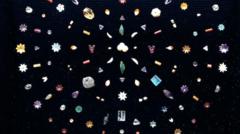
Sacred Relics, Unearthed in 1898, Spark Controversy as Sotheby's Prepares Auction
London, UK - A collection of sacred Buddhist jewels, discovered in Piprahwa, India, in 1898, is slated to be auctioned by Sotheby's, igniting a fierce debate surrounding the ethics of profiting from religious artifacts. The relics, believed by many to be fragments of the Buddha's own remains, have been the subject of intense scrutiny from religious leaders, historians, and cultural heritage advocates alike.
A Historical Discovery: Piprahwa and the Buddha's Relics
The story begins in the late 19th century, when British landowner William Claxton Peppé excavated a large brick stupa in Piprahwa, located near the ancient city of Kapilavastu. Within, he unearthed a soapstone casket containing bone fragments, along with a collection of precious stones, gold ornaments, and other valuable artifacts. The inscription on the casket, written in Brahmi script, suggested these were relics of the Buddha himself.
The discovery sent ripples throughout the archaeological and religious communities. While some scholars disputed the authenticity of the relics, others embraced them as tangible links to the historical Buddha. The relics were subsequently divided and distributed to various institutions and countries, including Thailand.
Sotheby's Auction: Details and Expected Value
Now, a portion of these relics, consisting primarily of precious jewels and ornaments discovered alongside the bone fragments, is scheduled to be offered for sale at Sotheby's. The auction house has described the collection as "exceptional" and "historically significant," estimating its value in the millions of dollars.
The auction catalog details the individual items, including:
- Gold pendants adorned with intricate carvings
- Gem-encrusted rings and bracelets
- Beads crafted from semi-precious stones such as lapis lazuli and carnelian
- Fragments of decorative metalwork
Sotheby's has defended its decision to auction the relics, stating that it has conducted extensive due diligence and is confident that the sale is legally and ethically sound. They also claim to be committed to ensuring the relics are acquired by a responsible collector or institution that will preserve them for future generations.
Ethical Concerns and Opposition
However, the planned auction has triggered widespread condemnation from Buddhist organizations, academics, and cultural heritage groups. Critics argue that selling relics associated with the founder of a major world religion is deeply disrespectful and insensitive.
Key concerns raised include:
- Profiting from Religious Artifacts: The commercialization of sacred objects is seen as inherently unethical, particularly when those objects hold immense spiritual value for millions of people.
- Potential for Misuse or Neglect: There are fears that the relics could end up in the hands of private collectors who may not appreciate their historical or religious significance, potentially leading to their neglect or even destruction.
- Cultural Appropriation: Some argue that the sale represents a form of cultural appropriation, as the relics are being removed from their cultural and historical context and commodified for profit.
- Lack of Consultation: Critics also point to the lack of meaningful consultation with Buddhist communities and religious leaders prior to the decision to auction the relics.
Calls for Repatriation and Alternative Solutions
Many are calling for the relics to be repatriated to India or other countries with significant Buddhist populations, where they can be displayed in museums or preserved in religious institutions, accessible to the public and treated with reverence.
Alternative solutions being proposed include:
- Donation to a Museum: A wealthy benefactor could purchase the relics and donate them to a reputable museum with a strong collection of Buddhist art and artifacts.
- Negotiated Sale to a Buddhist Organization: Sotheby's could negotiate a private sale to a Buddhist organization or institution that is committed to preserving the relics and making them available for study and veneration.
- Government Intervention: Governments could intervene to prevent the sale, citing concerns about cultural heritage and religious sensitivity.
The Future of the Relics
The controversy surrounding the Sotheby's auction highlights the complex ethical challenges involved in the trade of historical and religious artifacts. As the auction date approaches, the debate is likely to intensify, with pressure mounting on Sotheby's to reconsider its decision. The fate of these sacred relics, and the message their sale sends about the value we place on cultural heritage, remains to be seen.
Updates will be provided as the story unfolds.
```